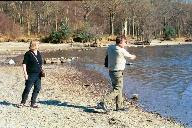To Canada House, our High Commission for a discussion between Canadian journalist Doug Saunders (Globe and Mail, etc) and British journalist Yasmin Alibhai-Brown on the subject of the myth of the Muslim tide, also the title of Saunders' latest book. We're lucky to have noticed it was on, lucky in that Saunders is one of the journos we follow on Twitter and he referenced it. So we emailed our request to the government and were duly informed that our names had been added to the list. We've often been to Canada House before, mostly in the old days to check our email and once, during the volcanic eruption no-fly time to be provided with rather superior biscuits and lukewarm advice, as well as internet access. This is a rather better part of the building, still undergoing lengthy renovations and expansion than we've been invited to visit before. It's the same location on Trafalgar Square, but this time we're taken upstairs to reception rooms with leather furniture and served wine as we wait for the discussion to begin (although it's still impossible not to think that for less than $10,000 we could do considerably better for them in the way of Canadian art for the walls).
The talk is a bit late starting but the time happily filled chatting, in part with Rouben Khatchadourian, political affairs counsellor at the High Commission. He's had various Middle East postings following a military career that took him to Bosnia and has a quiet, modest style and a commitment to the low key work of diplomacy that lasts beyond the length of a single parliament.
The discussion is interesting and works quite well unmoderated. Doug's basic thesis, backed up by many stats, is that there is no tide of "them" taking over "us". Numbers of Islamic immigrants are not enormous, most don't come from poor and overcrowded areas, and high percentages are well educated, committed to their adoptive countries and (within a generation) fairly typical citizens of their new homes in all respects including birth rates. Yasmin is, as always, more scattered and more passionate, equally distressed by racism in the west and by western over-optimistic tolerance of practices she regards as dangerous, such as the wearing of the hijab. Her point is that the growing insistence on having small children wear it is essentially a form of sexualising them. It's an interesting and valid point, but I can't help feeling some reluctance at the idea of identifying an ideal and then insisting that everyone adopt it. And there are practical difficulties. What precisely is a hijab, and will the queen be forbidden to wear a kerchief to the racetrack? There also seems to be no sense that there may be a protective social value in pluralism. Societies can go rogue and secularism is neither value free nor inevitably positive. Provocative though.





